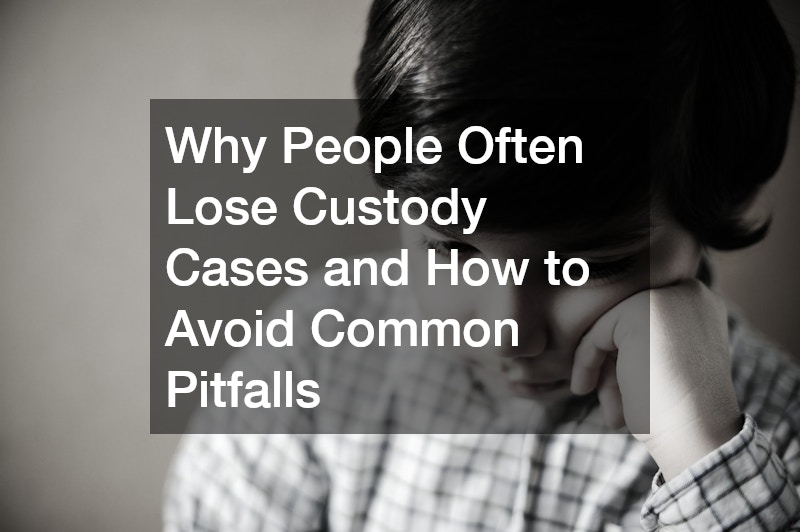Child custody cases are often emotionally charged and complex, making it challenging for parents to navigate the legal system effectively. Understanding why people frequently lose these cases and learning how to avoid common pitfalls can significantly improve one’s chances of achieving a favorable outcome. Here are the key factors that influence custody decisions and practical advice on how to approach these cases.
1. Overemphasis on the Other Parent’s Shortcomings
One of the primary reasons people lose custody cases is an excessive focus on the other parent’s shortcomings. While it is important to address legitimate concerns about the other parent’s ability to care for the child, constantly criticizing them can backfire.
Courts and experts often view this behavior as a sign of vindictiveness or anger, which can be detrimental to your case.
Advice: Instead of concentrating on the other parent’s flaws, highlight your strengths and capabilities as a parent. Demonstrate your ability to provide a stable, loving, and supportive environment for your child. Child custody lawyers recommend focusing on your positive qualities and the benefits you can offer to your child’s well-being.
2. Failure to Foster a Positive Relationship
Courts prioritize the best interests of the child, which includes the ability of each parent to foster a positive relationship between the child and the other parent. If you come across as punitive or unwilling to support this relationship, it can negatively impact your case. Judges and experts need to see that you can encourage love and affection between the child and the other parent.
Advice: Show your commitment to facilitating a healthy relationship between your child and the other parent. Be cooperative and flexible with visitation schedules and demonstrate your willingness to communicate and collaborate for the child’s benefit. This approach reflects positively on your ability to prioritize your child’s emotional needs.
3. Allowing Emotions to Take Over
Custody battles can be emotionally draining, but allowing emotions to dictate your actions and decisions can be a significant pitfall. When parents act out of anger, frustration, or resentment, it often leads to poor decision-making and behavior that the court views unfavorably.
Advice: Strive to remain calm, composed, and rational throughout the custody process. Child custody lawyers emphasize the importance of keeping emotions in check and approaching the case with a clear mind. By focusing on logical arguments and maintaining a respectful demeanor, you are more likely to be perceived as a stable and responsible parent.
4. Unrealistic Expectations
Another common mistake is having unrealistic expectations about the outcome of the custody case. Some parents enter the process with a rigid mindset, expecting to achieve everything they want without compromise. This approach can lead to disappointment and frustration when the court’s decision does not align with their expectations.
Advice: Be realistic about what you can achieve in your custody case. Understand that the court’s primary concern is the best interests of the child, which may require compromise and flexibility. Work with your child custody lawyer to set achievable goals and develop a strategy that considers both your needs and the child’s well-being.
5. Lack of Preparation and Documentation
Inadequate preparation and lack of documentation are significant reasons why people lose custody cases. Courts rely heavily on evidence and documentation to make informed decisions. If you fail to provide sufficient proof of your claims or neglect to organize your case effectively, it can harm your chances of success.
Advice: Thoroughly prepare for your custody case by gathering all relevant documents, including school records, medical records, and evidence of your involvement in your child’s life. Keep detailed records of interactions with the other parent, such as emails, texts, and notes from conversations. Presenting well-organized and comprehensive evidence strengthens your position and credibility in court.
6. Neglecting Legal Advice
Some parents underestimate the importance of seeking professional legal advice during custody cases. Attempting to navigate the legal system without the guidance of an experienced child custody lawyer can lead to costly mistakes and missteps.
Advice: Engage a reputable child custody lawyer early in the process to help you understand your rights, responsibilities, and the legal nuances of your case. An experienced lawyer can provide valuable insights, represent your interests effectively, and increase your chances of achieving a favorable outcome.
Conclusion
Child custody cases are inherently complex and emotionally charged, but understanding the common reasons why people lose these cases and learning how to avoid pitfalls can improve your chances of success. By focusing on your strengths as a parent, fostering a positive relationship with the other parent, managing your emotions, setting realistic expectations, preparing thoroughly, and seeking professional legal advice, you can navigate the custody process more effectively. Remember, the ultimate goal is to prioritize the best interests of your child and provide them with a stable, loving, and supportive environment.
.

